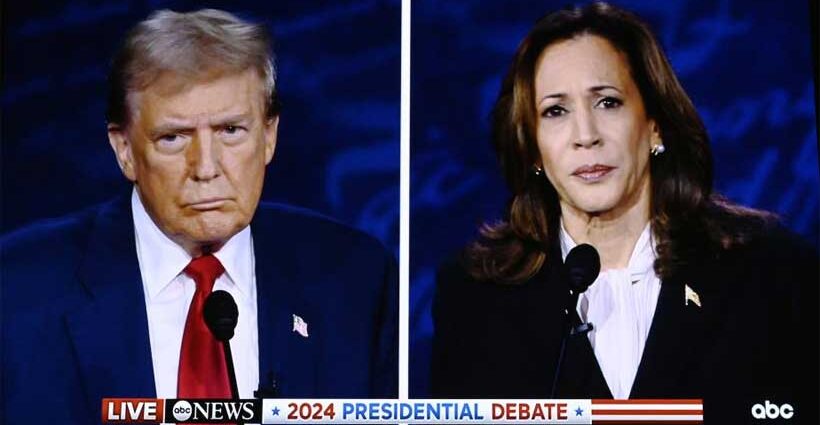

下边有中文翻译请继续看到底。 谢谢。)
The September 2024 U.S. presidential debate between Donald Trump and Kamala Harris was, unfortunately, characterized by a striking lack of substantive discourse on matters of public interest.
The September 2024 U.S. presidential debate between Donald Trump and Kamala Harris was, unfortunately, characterized by a striking lack of substantive discourse on matters of public interest. As someone who has followed U.S. politics closely since my student days, this debate stood out as a departure from the norm, where past presidential debates typically focused on policy differences, visions for the future, and each candidate’s strengths. In previous debates, while there were criticisms and disagreements, these were usually respectful and framed around policy matters rather than personal attacks.
However, in this particular debate, it became evident that both candidates spent more time in a blame game, engaging in personal attacks and political leg-pulling rather than focusing on the pressing issues facing the country. The debate lacked serious discussion of critical topics such as international relations, economic challenges, and domestic concerns like healthcare, education, and infrastructure. Instead of presenting a clear road map to address the challenges America faces, the debate was dominated by accusations, finger-pointing, and character assaults.
This shift toward a more negative and hostile tone in U.S. political debates raises concerns about the state of American democracy. Historically, the U.S. has been viewed as the world’s leading democratic nation, championing democratic values, civil discourse, and healthy political debate. However, the erosion of these values during this debate calls into question whether American democracy still stands as the global model it once was. The focus on personal attacks rather than policy critiques undermines the integrity of the electoral process and distracts from the important discussions that voters need to hear to make informed decisions.
As someone who has watched U.S. presidential debates in the past, the contrast was stark. What was once a forum for candidates to lay out their visions for America’s future has now devolved into a spectacle of negativity, more akin to the political maneuvering often associated with developing nations. This erosion of political discourse, where public interest is pushed to the sidelines, is deeply troubling. Ultimately, this debate reflects a broader deterioration in the values that once set American democracy apart. The tone and content of the exchange between Trump and Harris do not inspire confidence in the health of U.S. democratic practices.
Merits and De-merits
Public choice and merit play a crucial role in electing a president, as the American people weigh the performance of the current administration and the capabilities of the candidates. In the case of the Biden administration, many challenges have emerged both domestically and globally. The Afghanistan withdrawal, often seen as a debacle, left a lasting mark on U.S. foreign policy. The ongoing Ukraine war, escalating tensions with China, and the humanitarian crisis in Gaza all occurred during Biden’s tenure. Additionally, the global shift toward de-dollarization and the expansion of BRICS have added to concerns about America’s declining global influence.
Domestically, Americans have faced significant issues as well. Unemployment, inflation, economic uncertainty, and rising incidents of violence and racism have left many feeling unsafe. These factors have led to a growing sentiment that the Democrats may face difficulties in winning the upcoming presidential election based on their performance over the past four years.
Kamala Harris, while bringing diversity as a young, female, and non-White candidate with ties to the Obama and Biden administrations, was not initially positioned to lead the Democratic ticket. Her candidacy emerged after President Biden stepped down following the first debate with Trump, creating an unexpected opening for Harris. However, her nomination, while symbolically significant, may not be enough to overcome the challenges the Democrats face.
On the other hand, Donald Trump, the Republican contender, also carries his share of controversies and shortcomings. Despite this, the unpredictable nature of politics means that the outcome remains uncertain. Ultimately, it will be up to the American people to decide who they believe is best suited to lead the country through these turbulent times.
The public will evaluate the candidates based on their records, vision for the future, and ability to address the pressing issues at home and abroad. As always in politics, public sentiment can shift rapidly, making the final decision one that only the voters can make.
Global Expectations
The global expectations from the American presidential elections are significant, especially during a time of harsh, volatile, and hostile geopolitics. The world is looking for a leader who can bring peace, stability, and certainty in a landscape where economic growth, development, and prosperity are urgently needed. An ideal American president is expected to foster global cooperation, collaborate positively with other nations, and help transform the world into a better, more livable place.
The global community desires the end of ongoing wars and confrontations, hoping that disputes and differences will be resolved amicably under the framework of the United Nations Charter. There is also a strong expectation for free and fair-trade practices that benefit all, addressing global issues such as poverty, natural disasters, climate change, education, and healthcare.
Nations around the world seek equal treatment, without any form of hegemony, supremacy, or coercion. They expect respect for national sovereignty, regardless of a country’s size, wealth, or power. Justice, impartiality, and law-based governance are critical values that many believe the next U.S. president should uphold, ensuring the fair treatment of all countries.
In essence, the global community hopes for a president who can promote peace, mutual respect, and collaboration, working with others to create a fairer and more just international order.
不幸的是,2024年9月唐纳德·特朗普和卡玛拉·哈里斯之间的美国总统辩论的特点是在公共利益问题上明显缺乏实质性的论述。
不幸的是,2024年9月唐纳德·特朗普和卡玛拉·哈里斯之间的美国总统辩论的特点是在公共利益问题上明显缺乏实质性的论述。作为一个从学生时代起就密切关注美国政治的人,这次辩论与以往的总统辩论不同,它通常侧重于政策分歧、对未来的愿景以及每位候选人的优势。在之前的辩论中,虽然有批评和分歧,但这些通常是尊重的,并围绕政策问题展开,而不是人身攻击。
然而,在这场特别的辩论中,很明显,两位候选人都花了更多的时间在相互指责上,进行人身攻击和政治上的拉后腿,而不是关注国家面临的紧迫问题。这场辩论缺乏对国际关系、经济挑战以及医疗、教育和基础设施等国内问题等关键议题的严肃讨论。辩论中充斥着指责、相互指责和人身攻击,而不是提出解决美国面临的挑战的清晰路线图。
这种在美国政治辩论中转向更加消极和敌对的基调的转变,引起了人们对美国民主状况的担忧。历史上,美国一直被视为世界领先的民主国家,倡导民主价值观、公民话语和健康的政治辩论。然而,在这场辩论中,这些价值观遭到侵蚀,这让人质疑美国的民主是否仍然像过去那样是全球的典范。把重点放在人身攻击而不是政策批评上,破坏了选举过程的公正性,分散了选民在做出明智决定时需要听到的重要讨论的注意力。
作为一个过去看过美国总统辩论的人来说,这种对比是鲜明的。这个曾经是候选人展示他们对美国未来愿景的论坛,现在已经变成了一个消极的奇观,更类似于经常与发展中国家联系在一起的政治操纵。这种对政治话语的侵蚀——公众利益被推到一边——令人深感不安。最终,这场辩论反映了曾经使美国民主与众不同的价值观的更广泛的恶化。特朗普和哈里斯之间交流的语气和内容并没有激发人们对美国民主实践健康的信心。
是非曲直
公众选择和择优在总统选举中起着至关重要的作用,因为美国人民会权衡现任政府的表现和候选人的能力。就拜登政府而言,国内外都出现了许多挑战。从阿富汗撤军通常被视为一场溃败,在美国外交政策上留下了持久的印记。正在进行的乌克兰战争,与中国不断升级的紧张局势,以及加沙的人道主义危机都发生在拜登任期内。此外,全球向去美元化的转变和金砖国家的扩张增加了对美国全球影响力下降的担忧。
在国内,美国人也面临着重大问题。失业、通货膨胀、经济不确定性以及暴力和种族主义事件的增加使许多人感到不安全。因此,以民主党过去4年的表现为基础,在大选中获胜的可能性越来越大。
卡玛拉·哈里斯作为一名与奥巴马和拜登政府有联系的年轻、女性和非白人候选人,虽然带来了多样性,但她最初并没有被定位为民主党总统候选人。拜登总统在与特朗普的第一场辩论后辞职,这为哈里斯创造了一个意想不到的机会。然而,她的提名虽然具有象征意义,但可能不足以克服民主党面临的挑战。
另一方面,共和党候选人唐纳德•特朗普(Donald Trump)也有自己的争议和缺点。尽管如此,政治的不可预测性意味着结果仍然不确定。最终,将由美国人民来决定他们认为谁最适合领导这个国家度过动荡时期。
国民将根据候选人的履历、对未来的展望、解决国内外悬案的能力来评价候选人。一如既往,在政治中,公众情绪可能会迅速转变,只有选民才能做出最终决定。
全球的期望
全球对美国总统大选的期待意义重大,尤其是在地缘政治形势严峻、动荡和充满敌意的时期。世界迫切需要经济增长、发展和繁荣,世界正在寻找一位能够带来和平、稳定和确定性的领导人。一个理想的美国总统应该促进全球合作,与其他国家积极合作,并帮助把世界变成一个更美好、更宜居的地方。
国际社会希望结束目前的战争和对抗,希望争端和分歧将在《联合国宪章》的框架下得到友好解决。人们还强烈期望自由和公平的贸易做法惠及所有人,解决贫困、自然灾害、气候变化、教育和医疗保健等全球性问题。
世界各国寻求平等待遇,不追求任何形式的霸权、霸权或胁迫。他们希望国家主权得到尊重,无论国家大小、财富或实力如何。许多人认为,公正、公正和法治是下一任美国总统应该坚持的关键价值观,以确保公平对待所有国家。
从本质上讲,国际社会希望看到一位能够促进和平、相互尊重和合作的总统,与其他国家共同努力,建立一个更加公平、公正的国际秩序。
( 注意: 本文是用AI翻译的,或有误差。请以原版英文为准。谢谢。)
Reference Link:- https://moderndiplomacy.eu/2024/09/18/u-s-presidential-debate-between-donald-trump-and-kamala-harris/
